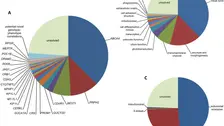BRIEF DESCRIPTION
Mutations in the prominin 1 (PROM1) gene can cause retinitis pigmentosa (RP), a progressive disease that leads to vision loss. The PROM1 gene encodes a protein that plays a structural role in the retina and mediates autophagy in the retinal pigment epithelium (RPE). Mutations in PROM1 can cause a variety of other conditions, such as cone-rod dystrophy, Stargardt disease, and another form of RP called Leber congenital amaurosis (LCA). Genetic testing and counseling are important for people diagnosed with RP.
The most common early symptom is loss of night vision, usually in childhood. RP also causes loss of peripheral vision, making it difficult to see things out of the corners of your eyes. RP is slow, but most patients eventually lose some vision.
There are no standard treatments for RP, but future therapies may include vitamin supplements, gene therapy, stem cell therapy, neuroprotective approaches, and retinal implants. Glasses can also help improve central visual acuity.







